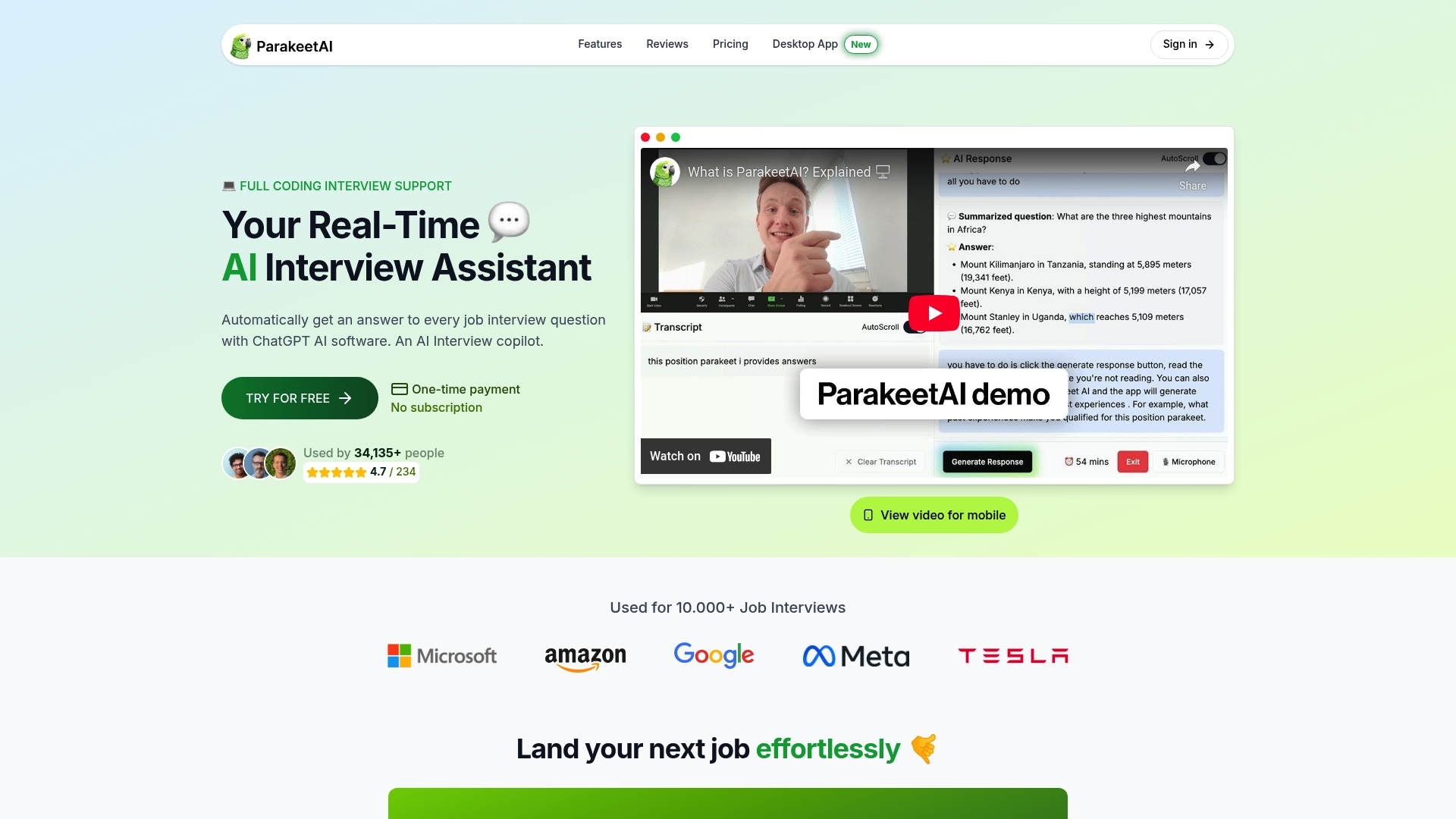Mock Interview Checklist for Confident Job Preparation

Nearly 60 percent of job candidates say mock interviews make them feel more prepared for real conversations. The right practice can mean the difference between nerves and true confidence. By following proven techniques, you can create a professional setting, focus on real interview questions, and use technology to sharpen your skills until you walk into your next interview ready to impress.
Quick Summary
| Key Point | Explanation |
|---|---|
| 1. Set Up a Quiet Space | Choose a distraction-free room to practice, away from household noise, ensuring focus and professionalism. |
| 2. Select Impactful Questions | Research and choose 5 to 7 relevant interview questions that reflect real scenarios for effective practice. |
| 3. Utilize AI for Feedback | Employ an AI interview assistant for objective insights on your responses and communication skills during mock interviews. |
| 4. Record and Analyze Sessions | Record your practice sessions to assess body language and verbal clarity, facilitating targeted improvements. |
| 5. Implement Feedback for Growth | Create a structured improvement plan based on feedback, focusing on essential areas to enhance your interview performance. |
Table of Contents
- Step 1: Set Up Your Interview Environment
- Step 2: Choose Relevant Interview Questions
- Step 3: Use An AI Interview Assistant Effectively
- Step 4: Practice And Record Your Responses
- Step 5: Review And Improve With Feedback
Step 1: Set Up Your Interview Environment
Creating the right environment for your mock interview is your first critical step toward building genuine interview confidence. You want a space that mimics professional settings while allowing you to perform at your absolute best.
Start by selecting a quiet room with minimal background noise. This means finding a space away from household traffic areas like kitchens or living rooms. A home office, bedroom, or study works perfectly. Close doors and windows to reduce unexpected sounds that might disrupt your practice session.
According to CareerGuider, timing your mock interview to match real interview durations helps enhance realism and prepares you for actual professional interactions. Aim for a 30 to 60 minute setup that feels like a genuine hiring conversation.
Technology matters as much as location. Ensure you have a stable internet connection if conducting a virtual practice interview. Position your camera at eye level with neutral background lighting. Test your microphone and webcam beforehand to avoid technical glitches that could throw off your concentration.
Pro Tip: Place a glass of water nearby and dress professionally even when practicing at home. These small details help you get into the right mental state.
If possible, use a neutral wall or plain background that looks clean and professional. Remove any distracting decorations or personal items from your camera frame. Your goal is to look polished and focused.
When everything is set up, take a deep breath. You are now ready to transform a simple room into your personal interview preparation zone. The next step will be running through your practice questions with confidence and precision.
Step 2: Choose Relevant Interview Questions
Selecting the right interview questions is your roadmap to a successful mock interview experience. Your goal is to simulate real world scenarios that will test your professional storytelling and problem solving skills.
According to CareerGuider, behavioral questions are crucial for revealing how you handle professional challenges. Focus on questions that start with prompts like “Tell me about a time when” or “Describe a situation where” to unpack your real world experience.
Start by researching common interview questions specific to your industry and role. A software engineer will face different scenarios compared to a marketing professional. Look for questions that explore your technical skills, leadership potential, and ability to work in team environments.
Pro Tip: Use the STAR framework (Situation Task Action Result) when crafting your responses to ensure they are structured and impactful.
Spread your questions across several key categories: professional achievements, problem solving scenarios, teamwork experiences, and personal growth moments. This diversity helps create a comprehensive practice session that mimics actual interview dynamics.

Consider practicing behavioral questions that challenge you to demonstrate adaptability and emotional intelligence. Questions about handling workplace conflicts or navigating complex team dynamics can reveal your professional maturity.
Remember that quality matters more than quantity. Select 5 to 7 high impact questions that truly test your ability to communicate effectively and showcase your professional narrative. Your next step will involve practicing these questions with confidence and precision.
Step 3: Use an AI Interview Assistant Effectively
An AI interview assistant transforms your mock interview preparation from a solo practice session into a sophisticated learning experience. Your goal is to leverage cutting edge technology to simulate real interview scenarios and receive precise feedback.
Leading platforms like MokaHR demonstrate how AI can provide structured interview practice with advanced analytics. Start by selecting an AI tool that matches your professional field and offers nuanced feedback on communication skills, technical responses, and overall interview performance.
A 2025 academic study revealed that AI driven mock interviews can significantly improve candidate confidence. When using an AI assistant, treat the interaction as seriously as you would a real interview. Dress professionally, set up your environment carefully, and answer questions with the same level of precision you would in an actual hiring conversation.
Pro Tip: Record your practice sessions so you can review your body language and verbal communication independently from the AI feedback.
Focus on understanding the role of AI assistants in interviews beyond simple question answering. These tools can analyze your tone, provide suggestions for improving articulation, and help you identify blind spots in your professional storytelling.
Listen carefully to the AI generated feedback. Unlike human reviewers, AI can provide objective insights without personal bias.
Pay special attention to recommendations about your communication style, answer structure, and areas where you can demonstrate more professional expertise.
Remember that an AI interview assistant is a practice tool not a replacement for human interaction. Use it to build confidence, refine your skills, and prepare for real world interviews. Your next step will involve reviewing and implementing the insights you have gained.
Step 4: Practice and Record Your Responses
Recording your mock interview transforms a simple practice session into a powerful self improvement tool. Your goal is to capture your performance objectively and identify areas where you can elevate your communication skills.
According to CareerGuider, recording mock interviews helps you pinpoint communication challenges like overusing filler words and assess your overall clarity. Use your smartphone or computer webcam to document your entire practice session.
Position your recording device to capture your full upper body. This allows you to analyze not just your verbal responses but also your body language and non verbal communication. Indeed emphasizes the importance of objectively reviewing your posture, tone, and overall presentation.
Pro Tip: Watch your recording with the sound muted first to focus purely on your body language and physical gestures.
After recording, set aside dedicated time for honest self review. Watch your performance as if you were an external interviewer. Pay attention to your speaking pace, enthusiasm, and how confidently you articulate your professional experiences.
Consider practicing answer interview techniques that help you sound more polished. Focus on reducing verbal fillers like “um” and “like” and work on maintaining consistent eye contact with your imaginary interviewer.
Remember that improvement comes from constructive self reflection. Do not get discouraged by initial observations. Each recording is an opportunity to refine your professional communication and build interview confidence. Your next step involves analyzing your recordings and creating a targeted improvement plan.
Step 5: Review and Improve with Feedback
Transforming interview feedback into actionable improvement is the key to your professional growth. Your mission is to convert critical observations into a strategic development plan that elevates your interview performance.
According to KRACD.com, effective feedback analysis requires focusing on specific areas like clarity, technical depth, communication structure, and overall confidence. Create a structured feedback journal where you document each critique and potential improvement strategy.
DesignGurus.io recommends categorizing your feedback into distinct domains technical skills, communication abilities, and presentation style. This systematic approach helps you build a comprehensive improvement roadmap.
Pro Tip: Rate your performance in each feedback category on a scale of 1 to 10 to track measurable progress over time.
Prioritize your improvement areas by impact. Some technical skills might require immediate attention while communication nuances can be refined gradually. Develop targeted practice sessions that address your weakest points systematically.
Consider mastering your mock interview skills through deliberate practice. Schedule regular review sessions where you intentionally focus on implementing feedback from previous mock interviews.
Remember that feedback is a gift not a criticism. Approach each suggestion with curiosity and openness. Your ability to adapt and improve demonstrates the kind of professional growth employers truly value. Your final step involves creating a personalized development plan that transforms insights into interview excellence.
Here’s a structured summary of each interview preparation step:

| Step | Main Goal | Key Actions |
|---|---|---|
| Set Up Environment | Mimic professional setting | Choose quiet room Test tech setup Dress professionally |
| Choose Questions | Simulate real scenarios | Research relevant questions Diversify topics Use STAR framework |
| Use AI Assistant | Receive objective feedback | Select suitable tool Treat like real interview Review AI insights |
| Practice & Record | Improve communication skills | Record responses Analyze body language Review objectively |
| Review & Improve | Create targeted plan | Document feedback Rate performance Schedule regular practice |
Ready To Boost Your Mock Interview Confidence Instantly?
Perfecting your interview skills can feel overwhelming, especially when it comes to identifying blind spots in your answers or body language. This article showed the importance of creating a realistic interview environment, practicing behavioral questions, using tools like AI interview assistants, and learning actively from your feedback. If you are feeling anxious about handling real pressure or wonder how to objectively analyze your performance, you are not alone. Many job seekers wish they could practice with instant, supportive feedback that pinpoints what actually matters.

Take control of your next interview with Parakeet AI. Our real-time AI interview assistant listens to your responses and gives you AI-powered answers to every question. Imagine receiving immediate, actionable suggestions so you can build unbeatable confidence before your big day. Do not leave your preparation to chance. Visit Parakeet AI now to start practicing smarter and turn your nerves into your biggest advantage. Your dream role is waiting.
Frequently Asked Questions
How do I set up my interview environment for a mock interview?
To set up your interview environment effectively, choose a quiet space free from distractions and ensure your technology is working properly. Aim to mimic a professional setting by dressing appropriately and using neutral background lighting.
What types of interview questions should I focus on for my mock interview?
Focus on behavioral interview questions that reveal your problem-solving skills and professional experiences. Aim to select 5 to 7 high-impact questions that cover areas like teamwork, adaptability, and technical expertise.
How can I effectively use an AI interview assistant during mock interviews?
Use an AI interview assistant to simulate real interview scenarios and gain objective feedback on your communication skills. Approach the practice seriously, as you would a real interview, and take notes on the AI’s recommendations for improvement.
What should I do after recording my mock interview?
After recording your mock interview, review the footage to assess your body language and verbal communication. Analyze your performance critically, noting areas for improvement such as clarity and confidence, and set specific goals for your next practice.
How can I transform feedback from my mock interviews into actionable improvements?
Document the feedback you receive in a structured manner, categorizing it into areas such as technical skills and communication abilities. Use this feedback to create a targeted improvement plan, focusing on high-impact areas to enhance your interview performance over time.




